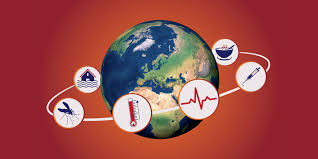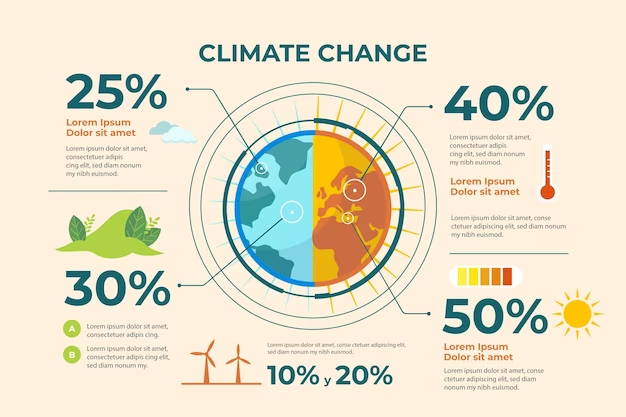Climate Change and Health 2025: A UK Perspective
Climate change is no longer a distant threat—its impacts are being felt globally and locally, and the UK is no exception. Beyond the environmental concerns, climate change poses significant risks to public health, making it a pressing issue that requires immediate attention. From the effects of air pollution to the rising frequency of extreme weather events, this blog explores how climate change is influencing health outcomes in 2025 and the steps needed to mitigate its impact on the UK population.
The Intersection of Climate Change and Public Health
Climate change affects health through a variety of pathways, including direct effects from extreme weather events and indirect consequences like air pollution, changes in disease patterns, and food insecurity. In the UK, the following factors are of particular concern:
1. Air Pollution
Air pollution is one of the most significant public health risks associated with climate change. In the UK, urban areas such as London, Manchester, and Birmingham frequently exceed recommended air quality limits. Key contributors include:
-
Vehicle Emissions: Despite the push for electric vehicles, diesel and petrol engines remain a major source of nitrogen dioxide (NO2) and particulate matter (PM2.5).
-
Industrial Pollution: Factories and power plants release harmful pollutants that exacerbate respiratory and cardiovascular conditions.
Health Implications:
-
Increased prevalence of asthma and chronic obstructive pulmonary disease (COPD).
-
Higher rates of heart attacks and strokes due to long-term exposure to fine particulates.
-
Developmental issues in children, including reduced lung capacity.
2. Extreme Weather Events
The UK has seen a marked increase in extreme weather events, including heatwaves, floods, and storms. Each of these has specific health implications:
-
Heatwaves: The summer of 2022 saw record-breaking temperatures, and 2025 is on track to surpass these extremes. Heat-related illnesses, dehydration, and heatstroke are on the rise, particularly among vulnerable groups such as the elderly.
-
Flooding: Heavy rainfall leads to flash floods, which not only cause injuries but also contaminate water supplies, increasing the risk of waterborne diseases.
-
Storms: High winds and storm surges disrupt healthcare services and increase the risk of accidents and injuries.
-

Health Implications:
-
Higher mortality rates during heatwaves, particularly in urban areas due to the "urban heat island" effect.
-
Outbreaks of gastrointestinal illnesses following floods.
-
Mental health issues, including anxiety and depression, are among those affected by property damage and displacement.
3. Vector-Borne Diseases
Warmer temperatures and changing rainfall patterns are creating favorable conditions for vector-borne diseases such as Lyme disease and West Nile virus. The UK has already seen a northward expansion of ticks and mosquitoes that carry these pathogens.
Health Implications:
-
Increased incidence of tick-borne Lyme disease, especially in rural areas.
-
Potential emergence of diseases previously uncommon in the UK due to the spread of invasive mosquito species.
4. Food and Water Security
Climate change disrupts food production and water supplies, leading to nutritional deficiencies and potential famine-like conditions.
-
Agricultural Impact: Unpredictable weather patterns affect crop yields, reducing the availability of fresh produce.
-
Water Scarcity: Prolonged droughts strain water resources, impacting both drinking water supplies and sanitation.
Health Implications:
-
Malnutrition and related conditions due to reduced access to healthy foods.
-
Increased prevalence of diseases caused by poor water quality, including gastrointestinal infections.
Vulnerable Populations
While climate change affects everyone, certain groups are disproportionately impacted:
-
Elderly Individuals: More susceptible to heat-related illnesses and the effects of air pollution.
-
Children: At higher risk of respiratory diseases and developmental issues due to environmental factors.
-
Low-Income Communities: Limited access to healthcare and safe housing exacerbates vulnerability.
-
Individuals with Pre-existing Conditions: Those with heart or respiratory conditions face heightened risks from air pollution and extreme weather events.
Mitigating the Health Impacts of Climate Change
Addressing the health effects of climate change requires a multi-pronged approach involving government action, community initiatives, and individual efforts.
1. Policy and Regulation
-
Stronger Air Quality Standards: Enforce stricter limits on pollutants and accelerate the transition to renewable energy.
-
Climate-Resilient Infrastructure: Invest in flood defenses, cooling systems, and other infrastructure to withstand extreme weather.
-
Green Urban Planning: Increase green spaces in cities to combat the urban heat island effect and improve air quality.
2. Healthcare System Adaptation
-
Preparedness for Extreme Weather: Equip hospitals and clinics to handle surges in heat-related and flood-related illnesses.
-
Training Healthcare Professionals: Ensure that healthcare workers can recognize and address climate-related health issues.
-
Public Health Campaigns: Raise awareness about how to stay safe during extreme weather and reduce exposure to pollutants.
3. Community and Individual Action
-
Local Initiatives: Encourage community programs that promote tree planting, recycling, and other eco-friendly practices.
-
Personal Choices: Reduce carbon footprints by using public transport, adopting energy-efficient practices, and supporting sustainable products.
-

The Role of Technology
Innovations in technology offer promising solutions to combat the health effects of climate change:
-
Air Quality Monitoring Apps: Help individuals avoid high-pollution areas and plan outdoor activities.
-
Early Warning Systems: Predict extreme weather events, allowing communities to prepare in advance.
-
Telemedicine: Provide healthcare access during floods or heatwaves when mobility is restricted.
Looking Ahead
As we progress through 2025, the link between climate change and public health becomes increasingly evident. Tackling this crisis requires a united effort from governments, communities, and individuals. By prioritizing health in climate policies and taking proactive steps, the UK can mitigate the adverse effects and protect its population from future risks.
Climate change is not just an environmental challenge; it is a health emergency. The time to act is now—for the well-being of current and future generations.











Top Comments You Can't Miss!